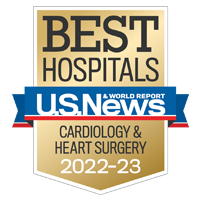
Complete Heart Block
Complete heart block occurs when the electrical signal can't pass normally from the atria, the heart's upper chambers, to the ventricles, or lower chambers. If the atrioventricular (AV) node is damaged during surgery, complete heart block may result. Sometimes complete heart block occurs spontaneously without surgery. An artificial pacemaker can restore a normal heart rate and rhythm.
Our Approach to Complete Heart Block
Over the past decades, UCSF has helped pioneer breakthroughs in the understanding and treatment of arrhythmias, or heart rhythm disorders, such as complete heart block. We offer comprehensive evaluations to pinpoint the source of the arrhythmia, as well as the most innovative treatments available. In patients with complete heart block, an implanted pacemaker can restore the heart to a normal rhythm. UCSF offers expert care before, during and after implantation of the pacemaker.
While providing specialized, tailored care is our primary focus, we are also dedicated to finding new treatments through research. Patients who choose to participate in clinical trials may have access to experimental therapies, devices or medications that might work better for them than the established options.
Awards & recognition
-

Among the top hospitals in the nation
-

One of the nation’s best in cardiology & heart surgery
UCSF Health medical specialists have reviewed this information. It is for educational purposes only and is not intended to replace the advice of your doctor or other health care provider. We encourage you to discuss any questions or concerns you may have with your provider.





